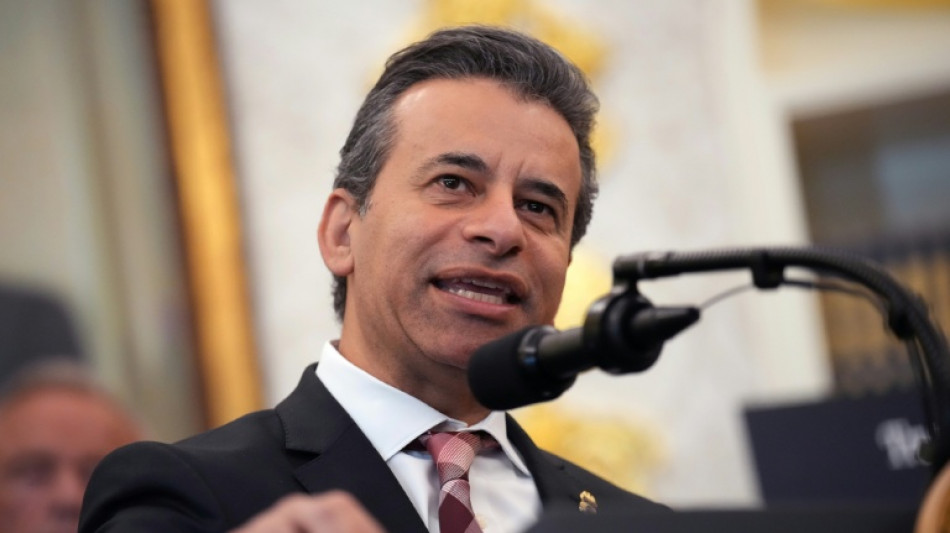
-
 Late Guirassy winner for Dortmund trims Bayern's lead atop Bundesliga
Late Guirassy winner for Dortmund trims Bayern's lead atop Bundesliga
-
'Free the mountains!": protest in Milan over Winter Olympics

-
 Gyokeres double helps Arsenal stretch Premier League lead
Gyokeres double helps Arsenal stretch Premier League lead
-
Six Nations misery for Townsend as Italy beat sorry Scotland

-
 Spain, Portugal face fresh storms, torrential rain
Spain, Portugal face fresh storms, torrential rain
-
Opinions of Zuckerberg hang over social media addiction trial jury selection

-
 Over 2,200 IS detainees transferred to Iraq from Syria: Iraqi official
Over 2,200 IS detainees transferred to Iraq from Syria: Iraqi official
-
Norway's Ruud tops Olympic men's freeski slopestyle qualifying

-
 Czech qualifier Bejlek claims first title in Abu Dhabi
Czech qualifier Bejlek claims first title in Abu Dhabi
-
French duo reach Shanghai, completing year-and-a-half walk

-
 Australian snowboarder James eyes elusive Olympic gold
Australian snowboarder James eyes elusive Olympic gold
-
Sequins and snow: Eva Adamczykova makes Olympic return

-
 Vonn set for Olympic medal bid after successful downhill training
Vonn set for Olympic medal bid after successful downhill training
-
Shepherd takes hat-trick as West Indies beat Scotland in T20 World Cup

-
 Sausages will sell after thrill-seeker Von Allmen wins Olympic downhill
Sausages will sell after thrill-seeker Von Allmen wins Olympic downhill
-
Swiss racer Von Allmen wins first gold of Winter Olympics

-
 'Wake up': Mum sparks comeback after scare for freeski star Gu
'Wake up': Mum sparks comeback after scare for freeski star Gu
-
Von Allmen wins men's Olympic downhill gold, first of Games

-
 First medals up for grabs at Winter Olympics
First medals up for grabs at Winter Olympics
-
Afghanistan captain Khan harbours dream of playing in Kabul

-
 Lindsey Vonn completes second Winter Olympics downhill training run
Lindsey Vonn completes second Winter Olympics downhill training run
-
Freeski star Gu survives major scare in Olympic slopestyle

-
 Iran FM looks to more nuclear talks, but warns US
Iran FM looks to more nuclear talks, but warns US
-
Hetmyer's six-hitting steers West Indies to 182-5 against Scotland

-
 After boos for Vance, IOC says it hopes for 'fair play'
After boos for Vance, IOC says it hopes for 'fair play'
-
Thousands gather as Pakistan buries victims of mosque suicide attack

-
 Lindsey Vonn completes second downhill training session
Lindsey Vonn completes second downhill training session
-
US pressing Ukraine and Russia to end war by June, Zelensky says

-
 Faheem blitz sees Pakistan avoid Netherlands shock at T20 World Cup
Faheem blitz sees Pakistan avoid Netherlands shock at T20 World Cup
-
Takaichi talks tough on immigration on eve of vote

-
 England's Salt passed fit for T20 World Cup opener
England's Salt passed fit for T20 World Cup opener
-
Spain, Portugal brace for fresh storm after flood deaths

-
 Pakistan bowl out Netherlands for 147 in T20 World Cup opener
Pakistan bowl out Netherlands for 147 in T20 World Cup opener
-
Pushed to margins, women vanish from Bangladesh's political arena

-
 Crypto firm accidentally sends $40 bn in bitcoin to users
Crypto firm accidentally sends $40 bn in bitcoin to users
-
Pistons end Knicks' NBA winning streak, Celtics edge Heat

-
 Funerals for victims of suicide blast at Islamabad mosque that killed at least 31
Funerals for victims of suicide blast at Islamabad mosque that killed at least 31
-
A tale of two villages: Cambodians lament Thailand's border gains

-
 Police identify suspect in disappearance of Australian boy
Police identify suspect in disappearance of Australian boy
-
Cuba adopts urgent measures to address energy crisis: minister

-
 Not-so-American football: the Super Bowl's overseas stars
Not-so-American football: the Super Bowl's overseas stars
-
Trump says US talks with Iran 'very good,' more negotiations expected

-
 Trump administration re-approves twice-banned pesticide
Trump administration re-approves twice-banned pesticide
-
Hisatsune leads Matsuyama at Phoenix Open as Scheffler makes cut

-
 Beyond the QBs: 5 Super Bowl players to watch
Beyond the QBs: 5 Super Bowl players to watch
-
Grass v artificial turf: Super Bowl players speak out

-
 Police warn Sydney protesters ahead of Israeli president's visit
Police warn Sydney protesters ahead of Israeli president's visit
-
Simi Khanna Launches Simi Beauty SK: A Natural Skincare Line Blending Luxury, Wellness, and Purpose

-
 Best Gold IRA Companies February 2026 Announced (Top Gold-backed IRA Companies Revealed)
Best Gold IRA Companies February 2026 Announced (Top Gold-backed IRA Companies Revealed)
-
Bolivia wants closer US ties, without alienating China: minister


US to remove warnings from menopause hormone therapy
The US health regulatory agency on Monday said it would direct manufacturers to remove a bold warning on many hormone therapies used to alleviate menopausal symptoms, saying the risks have been exaggerated.
Hormone Replacement Therapy can be taken to replace estrogen that the body stops producing during menopause -- the natural process that ends female reproductive years -- with the aim of alleviating symptoms that can be physically and mentally debilitating including hot flashes, brain fog, insomnia, night sweats, joint pain and bone loss.
It once was used routinely, but a major 2002 study that was aimed at exploring how the therapies could prevent chronic disease pointed to risks associated with specific HRT formulations.
Since then "black box warnings" -- the strongest warning the US Food and Drug Administration can require on prescription drugs -- have sounded alarm over increased HRT risks including of certain cancers, cardiovascular conditions and probable dementia.
Prescription and use of the therapies over recent decades plummeted.
But the matter remains one of debate, and critics have pointed to flaws with the early-2000s study, whose trials were halted as risks appeared: namely it focused on women who were on average a decade-post menopause and in their 60s, when cardiovascular risks increase regardless.
Today guidance generally indicates that newly menopausal or perimenopausal women -- broadly in their late 40s or 50s -- are potential candidates for treatment.
There also are newer, more localized or lower-dose forms of the therapies available.
"We're challenging outdated thinking and recommitting to evidence-based medicine that empowers rather than restricts," US health chief Robert F. Kennedy Jr said in introducing the measure.
- More nuance -
Many members of the medical community have urged revisiting the label, which they say can scare women for whom benefits may outweigh risks.
Others have voiced concern that changes shouldn't come without a transparent review process that convenes independent experts.
FDA head Marty Makary dismissed that notion in a Monday briefing, saying such committees are "bureaucratic, long, often conflicted and very expensive.
"People have felt demoralized in this field. We've made almost no progress in assessing the evidence for years."
FDA officials have emphasized the new label will provide for more nuanced discussion between patients and doctors in evaluating whether HRT can be right for individuals.
Typically women in a low-risk category have healthy vitals including weight and blood pressure as well as normal-range cholesterol levels, with no history or a lower risk of developing breast cancer. They are also within the first 10 years of beginning menopause.
The president of the American College of Obstetricians and Gynecologists, Steven Fleischman, commended the FDA's move, saying "the updated labels will better allow patients and clinicians to engage in a shared decision-making process."
Fleischman said in a statement the change would not shift the ACOG's guidance on estrogen therapy, but noted it was important to distinguish between systemic estrogen products -- including methods taken orally or via patches -- and low-dose vaginal estrogen.
"Like all medications, systemic estrogen products are not without risk, and their use should be based on an individualized conversation between patients and their clinicians," the health association said.
The FDA said it is not seeking to remove the boxed warning for endometrial cancer for systemic estrogen-alone products.
P.Santos--AMWN


